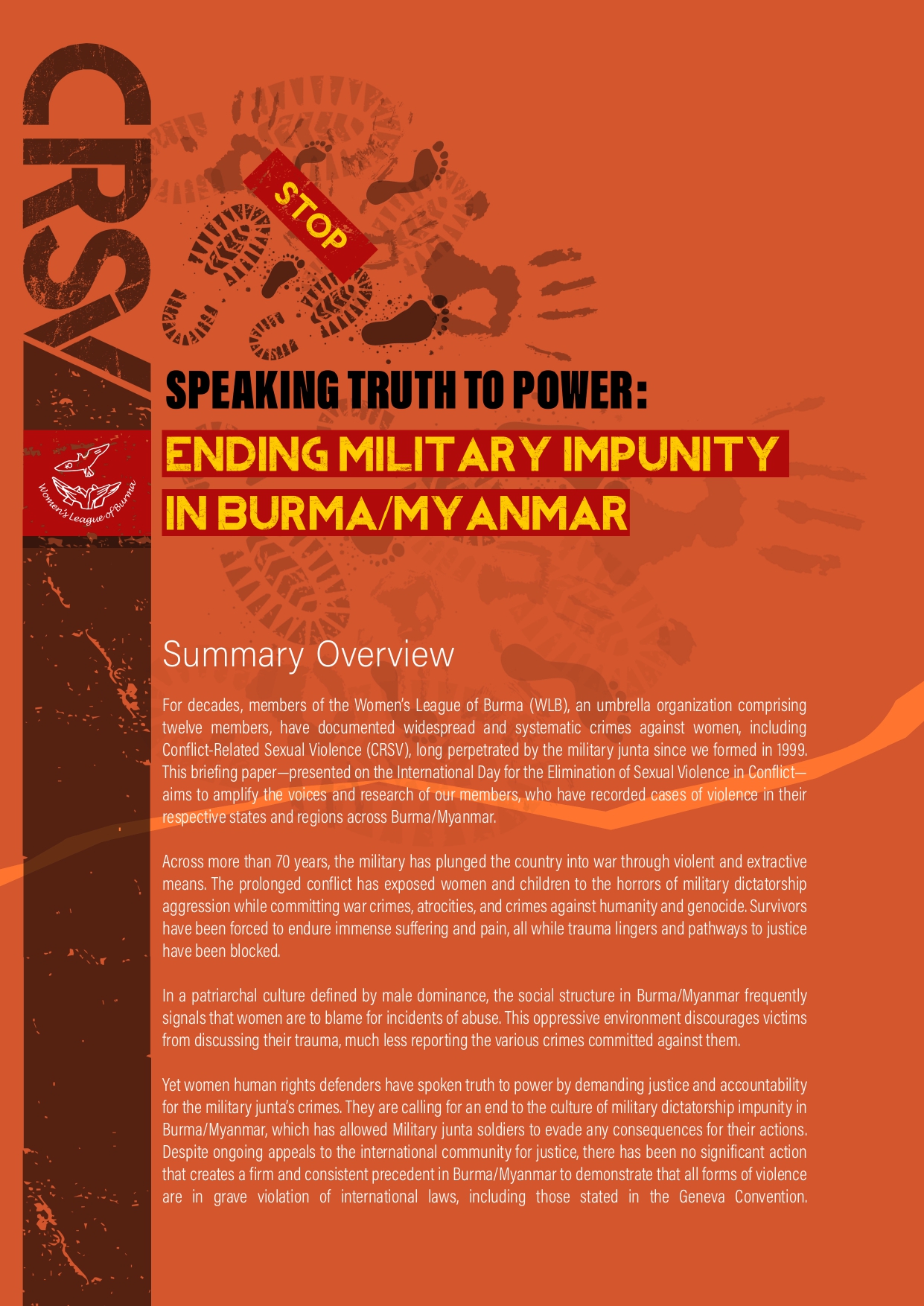Summary Overview
For decades, members of the Women’s League of Burma (WLB), an umbrella organization comprising twelve members, have documented widespread and systematic crimes against women, including Conflict-Related Sexual Violence (CRSV), long perpetrated by the military junta since we formed in 1999. This briefing paper—presented on the International Day for the Elimination of Sexual Violence in Conflict— aims to amplify the voices and research of our members, who have recorded cases of violence in their respective states and regions across Burma/Myanmar.
Across more than 70 years, the military has plunged the country into war through violent and extractive means. The prolonged conflict has exposed women and children to the horrors of military dictatorship aggression while committing war crimes, atrocities, and crimes against humanity and genocide. Survivors have been forced to endure immense suffering and pain, all while trauma lingers and pathways to justice have been blocked.
In a patriarchal culture defined by male dominance, the social structure in Burma/Myanmar frequently signals that women are to blame for incidents of abuse. This oppressive environment discourages victims from discussing their trauma, much less reporting the various crimes committed against them.
Yet women human rights defenders have spoken truth to power by demanding justice and accountability for the military junta’s crimes. They are calling for an end to the culture of military dictatorship impunity in Burma/Myanmar, which has allowed Military junta soldiers to evade any consequences for their actions. Despite ongoing appeals to the international community for justice, there has been no significant action that creates a firm and consistent precedent in Burma/Myanmar to demonstrate that all forms of violence are in grave violation of international laws, including those stated in the Geneva Convention. Women and the LGBTQI community face increasing rates of sexual violence without justice and accountability. Sexual violence is on the rise, with the military junta being the primary perpetrator. However, some victims have also been exploited by the country’s resistance People’s Defense Forces (PDFs), the military arm of the National Unity Government (NUG), and the Ethnic Resistance Organizations (EROS). Local resistance groups have their own accountability systems, but there remains space to engage them on human rights. The junta, by contrast, has spent decades avoiding responsibility for its crimes and continues to operate under the protection of military Junta impunity.
Over the last decade, WLB members have documented numerous cases that demonstrate how domestic protections and the judicial system, with their legal frameworks, have failed survivors and their families. In Burma/Myanmar, armed groups frequently employ various forms of violence, particularly in ethnic conflict-affected areas, as a means of control and repression, undermining the dignity, safety, and security of women and girls.
While there is a law against rape in the Penal Code, Section 375, with a punishment of up to ten years, many limitations within it fail to preserve the integrity of the victim. Often, women in Burma/ Myanmar also do not receive adequate legal protections, including basic protections for privacy and legal representation. Notably, since the Military attempted a 2021 coup, all provisions, even those that were grossly inadequate to protect victims, have been entirely ignored by the junta.
In addition to providing a contextual analysis of concerns about CRSV in Burma/Myanmar, the findings presented in this briefing paper demonstrate how women-led organizations of the WLB have fiercely advocated for mechanisms and protections for survivors at the regional and international levels. Case studies by our members will be included as an evidence-based tracker of how ethnic women across all states and regions have been affected by the various forms of CRSV including the use of rape as a weapon of war.
Further, “Speaking Truth to Power: Ending Military Impunity in Burma/Myanmar” seeks to address the dark history of the military and their crimes of gender-based violence (GBV), sexual gender-based violence (SGBV) and CRSV, along with their direct impacts on women and conflict-affected communities. It will serve as a tool to approach the response to CRSV with strengthened and renewed calls for accountability. Combined with analysis, this briefing will present evidence that makes it alarmingly clear the systematic nature of the junta’s crimes against women, as well as the urgency required for global stakeholders to act on the recommendations presented to ensure an end to military rule in Burma/Myanmar.
